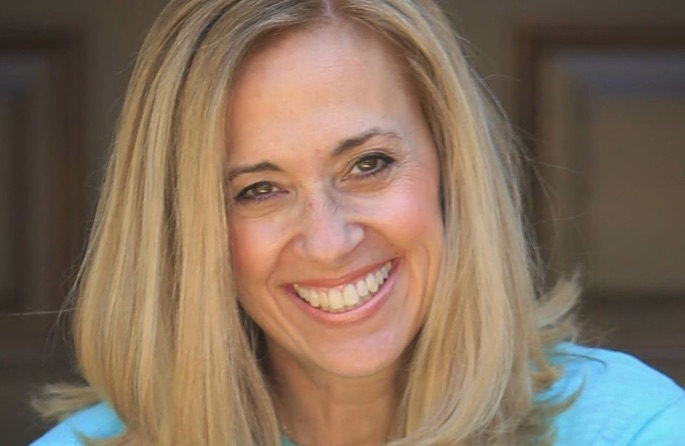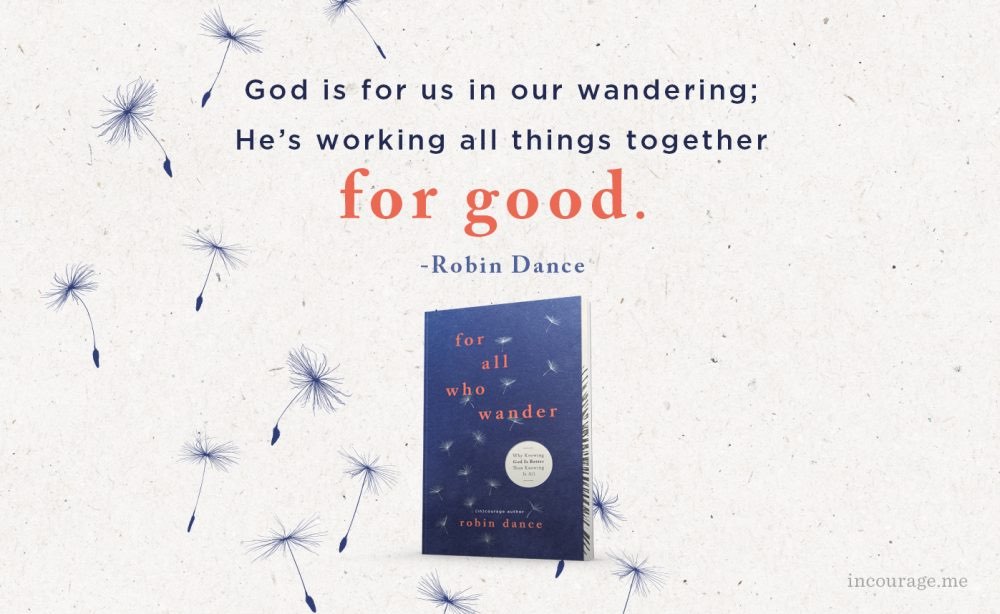Faith is tidy and neat for some, never unwavering and always so sure. And maybe that’s how you used to feel, but now your once-sure beliefs are less certain, the prescribed faith of your youth no longer enough. Sound familiar? Ever heard yourself mirror the cry of the Bible, “Lord, I believe. Help my unbelief!” (Mark 9:24)? Us too.
Perhaps life isn’t turning out like you thought it would. Heartbreak and challenges stir doubt. Sunday school answers fall short. God seems distant. We have ALL been there, ladies.
Luckily, we found a solution: Robin Dance's new book For All Who Wander: Why Knowing God Is Better than Knowing It All. And, doesn't that title alone give you a sense of peace, love? When the trials of life hit and God's Word doesn't match up with thwat we see, there's just one thing to hold onto: HIM. This book allows you the tools to bandon the guilt and shame attached to your questions or doubts... which, we could all use a bit of sometimes!
Let's spend some time with Robin, shall we?

Who's the book for?
At first glance it might seem like this message is only for people who are struggling in their faith or have been there before. And, the strong possibility exists that if you aren’t struggling now, you may be in the future. That being said, it can also serve anyone who knows someone else who is wandering and wrestling with doubt (children, friends, co-workers, etc.). People who are rock solid in their faith get a glimpse into the heart and mind of someone who has come extremely close to walking away from the church, her faith and even God.
There’s a secondary reader I hadn’t even considered when I was writing this book: pastors and church leaders. This revelation came to me after I had asked my former pastor to read through a section of the book that was particularly difficult to write. I had quietly struggled with some things I observed in our church at the time, and he told me how valuable it was for a pastor to hear “the view from the pew,” that pastors aren’t always privy to the thoughts of those sitting in their congregations. For that reason, I hope pastors and leaders find their way to this book, to prompt them to seek out the unique perspective of their members and to be intentional when they preach or teach about encouraging members who may be struggling with doubt and uncertainty.
Writing process?
Surprising, faith-building, at times painful and incredibly satisfying!
Surprising – I had always imagined writing a book would be like writing a series of blog posts. I learned very quickly it wasn’t like that at all. Because I was approached to write this book without first having completed a proposal, that came after the fact. And because the idea didn’t originate with me, it took a while to get into a good writing rhythm. Two other things that surprised me were how much I needed a community to pray for, encourage and support me (you may write in isolation but you’re never completely alone) and how focusing on word count was not what I should have been concerned about at all; telling the story was.
Faith-building – Never in my life have I been more aware of my need for God than when I was writing this book. I’m incredibly self-reliant and can usually do things in my own strength, but in writing this book I came face to face with my inadequacies and desperate need for God to impart the wisdom and discipline to complete what I believe he called me to. I would literally sit in front of my computer every morning, and beg him for the next thought, story and sometimes the next word. I’d pray with open hands asking to receive what he wanted me to give to the readers.
Painful – Ugh! One of the most interesting exercises I did to help with story arc and telling a complete story was to construct a timeline, mainly during the “Wander Years.” It was shocking to me what I discovered: the things that were going on relationally and spiritually in my life when I was striving for professional recognition and applause from the world. I actually apologized to my husband because I realized some things I hadn’t seen before. Revisiting who I was during my darkest moments and a season when I was really struggling grieved me more than I anticipated.
Satisfying – To have completed a project I believe God called me to was its own reward, long before the book was edited, printed or in my hands. There was a point I was genuinely concerned I couldn’t finish it, about 80 percent of it written, and I wondered out loud, in tears, with some friends, “What if I can’t finish it? How do I break a contract?” They immediately sat me down and prayed over me, and I’m convinced that was just one more way for God to show up. I ended up with close to 80,000 words, and because it made sense, we were able to put together a companion guide to help readers connect the dots in their own stories of wrestling with their faith.
Wandering vs. being lost?
The difference between wandering and being lost (at least as it relates to this book) is rooted in salvation. At some point in her (or his) life, the Wanderer has acknowledged her sin and need of a Savior, has repented and turned to Jesus to receive forgiveness and new life in him, to claim Jesus alone as the way, the truth and the life. The Wanderer has been saved from darkness and death to light and eternal life. Being lost in a salvific sense means never having turned in repentance from your sin and professed faith in Jesus. The Wanderer is a believer or Christ follower or Christian (there are so many ways to express this in today’s world!), but for any number of reasons, she’s taken her eyes off Jesus and strayed from what he has in mind for her life.
My own season of wandering wasn’t prompted by one thing; it was prompted by many things. It was subtle and slow. First, I think I had too cavalier of an attitude toward the very real power of Satan, the allure of the world and the strength of my flesh, all conspiring against me (and every believer) in my relationship with Jesus. Scriptures that come to mind include:
- 1 Peter 5:8 Be sober-minded, be alert. Your adversary the devil is prowling around like a roaring lion, looking for anyone he can devour.
- 1 John 2:16 For everything in the world—the lust of the flesh, the lust of the eyes, and the pride in one’s possessions—is not from the Father, but is from the world.
- Ephesians 6:12 For our struggle is not against flesh and blood, but against the rulers, against the authorities, against the cosmic powers of this darkness, against evil, spiritual forces in the heavens.
- Galatians 5:17 For the flesh desires what is against the Spirit, and the Spirit desires what is against the flesh; these are opposed to each other, so that you don’t do what you want.
Also, I had a very performance-based faith by equating my “works” with godliness, and I was extremely self-reliant and more than happy to do things my way and in my own strength. I constructed idols that served and made much of myself, and I sought the approval of people over pleasing God. As I focused on myself at the expense of worshipping and knowing God, I was falling into a misappropriated sense of identity, forgetting – or at least not finding my value in – who God says I am.
When you were "wandering," what helped?
I was that frog in a pot of water that was slowly heating up, not realizing I was in trouble until I was in trouble. When I was living it, I didn’t see it so much as a temporary season of wandering but possibly as evidence I may never have been saved at all. Doubt and unbelief pointed fingers of condemnation and accusation at me, and I found myself unworthy and unlovable. I write about this in the book: the moment that I was just done and how God gave me a lifeline, a very specific image to represent his faithfulness to me.
There were two things that helped me and made a huge difference when I was struggling:
1. During a sermon one Sunday, my pastor talked about unbelief and doubts, and he addressed those of us who were wrestling with our faith. He said something to the effect of God not being offended by our questions and that he could be using those very things to draw us into relationship with him. The idea that my questions and doubts could be bridging the gap between me and God as opposed to creating an ever-increasing chasm was revolutionary. I would hold onto that thread for years before getting to the other side of my spiritual desert.
2. It’s odd to me now, and strong evidence of God’s faithfulness and kindness, but the other crucial thing that helped me was I actually sought God for my answers. Rather than “checking the temperature of the room” by looking to church, culture or other people for answers, I really did seek God for answers. That seems counter-intuitive to me now, but I firmly believe it was nothing but the grace of God and the work of the Holy Spirit steering me in that direction.
How can we help those in seasons of doubt?
Ha! They can gift their wandering friend a copy of my book! On a serious note, they should pray about how God is leading them to encourage the Wanderers in their life. They should not try to be an apologist of the faith but rather provide a safe space for their loved one to share their heart and the honest state of their faith. Don’t pass judgment, don’t be defensive and don’t worry; none of those things is helpful, and they could be harmful! I know this might be easier said than done, but a Wanderer has to discover the reality of knowing God on her own; it will never happen because you preach at her, hurl Bible verses at her or try to convince her. Just love her! I wish I had had the guts to reach out to someone I respect and talk candidly about my struggles and frustrations. The battle was definitely quiet on the outside but loud on the inside.
You’d go back and tell yourself ___ while wandering?
If I could go back in time, I’d hug myself and say, “Extend a little grace and be gentle with yourself. God IS at work in your wandering, whether or not you believe it or sense his presence. He will use this season for your good, his glory, and the advance of the gospel. Where you are today is NOT where you’ll always be, and your questions are a bridge leading back to God, not away from him.”
I want other wanderers to know their unbelief or questions aren’t sinful in and of themselves, and that God can’t wait to use their experience to encourage others. I want them to realize guilt and condemnation are not coming from God. The Holy Spirit will convict us of our sin, and that demands a response, but if you’re like me, it might take a while; that’s okay. I don’t think you can shortcut the process. Asking questions, exploring your doubts, finding your idols or coming to terms with your own sin or disobedience is deep heart work, but it’s worth it. God is praying for them with the expectation they will return to him, and when they do, they’ll be equipped to strengthen others by sharing their story.
Hope for readers?
My great hope and prayer for readers is to realize they aren’t the only one struggling in their faith, to recognize their doubts and questions can actually be a bridge leading back to God, to discover God’s faithfulness doesn’t depend on their faithfulness and to come to know God personally and intimately.
I hope they have a greater measure of love for God and others, including themselves. I hope that their identity is rooted securely in who God says they are, that they sense the Holy Spirit stirring their hearts to believe that the one who has called them is faithful (1 Thessalonians 5:24), that God is faithful to complete the work he started in their lives (Philippians 1:6) and that he is working all things together for good (Romans 8:28)—even their season of wandering.








